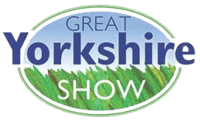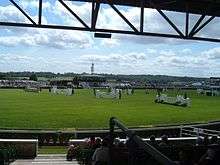Great Yorkshire Show
The Great Yorkshire Show (GYS) is an agricultural show which takes place on the Great Yorkshire Showground in Harrogate, North Yorkshire in the North of England annually from the second Tuesday of July until the following Thursday. It is organised and run by the Yorkshire Agricultural Society (YAS). Since the demise of the Royal Show the GYS has been the largest agricultural show in England, however within the UK it is surpassed by both the Royal Welsh Show and the Royal Highland Show. The show is highly successful and the Society generated income of £9.6 million in 2016.[1] A new Hall at the showground, costing £11 million, opened in 2016 and produced more than £1 million of income in its first year.

History
The history of the GYS is intimately connected with that of the Yorkshire Agricultural Society (YAS).
- 1837: The YAS was founded; its primary aim was stated as "... to hold an Annual Meeting for the Exhibition of Farming Stock, Implements &c., and for the General Promotion of Agriculture."[2]
- 1838: The first YAS Show was held in the Barrack Yard at Fulford, near York.[3] The numbers attending were not recorded, but the event was counted a success; police had to use their batons to restore order among the large numbers of visitors when they began to force their way in without paying.[4]
- Originally intended as a peripatetic event, the Show moved to Leeds, Northallerton and Kingston upon Hull in subsequent years.
- 1842: The show returned to York. This is the first year for which attendance figures are available — the Show in 1842 had a paid attendance of 6,044.[5] By 1843 the YAS Show had become known as the "Great Yorkshire Show", apparently by popular acclamation rather than in any official sense.[6]
- The GYS continued to be held in various places around Yorkshire until 1950.
- 1915–1919: Cancelled due to the First World War.
- 1920: The GYS was held jointly with the Royal Agricultural Society of England in Darlington.
- 1931: Huddersfield http://www.examiner.co.uk/news/west-yorkshire-news/great-yorkshire-show-came-huddersfieldin-4971672
- 1933: The GYS was held in Marton in Middlesbrough.
- 1940–1948: Cancelled due to the Second World War.
- 1948: By now the YAS was coming to the conclusion that the expenses involved in setting up a new showground every year were becoming prohibitive.[7]
- 1949: It was decided that a permanent showground be acquired.
- 1950: The last peripatetic show, in Malton. The YAS bought a site at Hook Oval in Harrogate for £16,500.
- 1951: From here on, Hook Oval in Harrogate has been the permanent site for the GYS. The 1951 the attendance figure was nearly 54,000.
- 2001: Cancelled due to the outbreak of Foot and mouth disease in Britain.
- 2006: The most successful show so far in terms of attendance figures,[5] with 135,111 visitors.
- 2008: The show was attended by the Queen to celebrate the 150th occasion on which the Show had been held.[8]
- 2011: The show came close to the record with 135,086 visitors.[9]
- 2012: This show (the 154th) was cancelled on Tuesday 10 July 2012 after only one day due to exceptional rain which had made the showground car parks unsafe. Organisers stated that the decision had been taken "reluctantly".[10] This was the first cancellation due to weather. (Earlier cancellations had been due to war or foot and mouth disease.) An old bulldozer towed horse boxes out of muddy ground.
- 2017: The show was held on Tuesday 11 – Thursday 13 July 2017. This was the 159th show.
- 2018: This was the 160th show and was held on Tuesday 10 – Thursday 12 July 2018.[11]
- 2020: The show (the 162nd), which would have been held on the Tuesday 14 - Thursday 16 July 2020, was cancelled on Monday 23 March 2020 due to the COVID-19 Pandemic. This is the first show to be fully cancelled since 2001.[12]
The Showground

The Great Yorkshire Showground is situated off Railway Road, on the outskirts of Harrogate. The site is 250 acres (100 ha) in area, and consists mainly of grassland with several permanent structures. These include
- Main grandstand and show-ring
- Country Pursuits arena (featuring Hounds and Birds of Prey)
- Flower Show
- "White Rose" grandstand and show-ring
- Housing for cattle, sheep, pigs and other livestock
- Multi-purpose conference and exhibition halls (known as the "Yorkshire Event Centre" [13])
- Dining and function facilities (known as "Pavilions of Harrogate" [14] and "Fodder" [15])
- Office accommodation for the Yorkshire Agricultural Society, which has its headquarters at the showground
The showground facilities are used all the year round for various functions and events ranging from the Great Yorkshire Show to antiques fairs, trade shows, business conferences and wedding receptions. It is estimated that some 1 million people visit the showground per year.
Notes
- http://yas.co.uk/uploads/files/YAS_Annual_Report__Accounts_2016.pdf
- Transactions of the Yorkshire Agricultural Society 1837-8, 1: 1
- Mitchinson, James, ed. (11 July 2018). "Anita's a model hit on celebrity catwalk". The Yorkshire Post. p. 12. ISSN 0963-1496.
- A History of the Yorkshire Agricultural Society (AHYAS) p. 53
- Quoted attendance figures are for "paid attendance". This does not include attendance by members of the YAS as members are entitled to free entry to the Show
- Yorkshire Gazette 2 September 1843 p.7
- AHYAS p. 168
- Nicola Fenwick (10 July 2008). "Queen makes show a right royal affair". The Northern Echo. Newsquest Media Group. Retrieved 11 July 2008.
- "Great Yorkshire Show attracts near-record crowds". BBC News Online. BBC. 16 July 2011. Retrieved 17 July 2011.
- Martin Wainwright (10 July 2012). "Great Yorkshire Show cancelled after torrential rain". The Guardian. Guardian News and Media Limited. Retrieved 11 July 2013.
- "Great Yorkshire Show 2018". Great Yorkshire Show. Retrieved 2 February 2018.
- Newton, Grace (23 March 2020). "The Great Yorkshire Show 2020 has been cancelled". The Yorkshire Post. Retrieved 19 May 2020.
- : Yorkshire Event Centre
- : Pavilions of Harrogate
- : Fodder
References
- Hall, Vance (1987). A History of the Yorkshire Agricultural Society 1837—1987. London: Batsford. ISBN 978-0-7134-5783-4